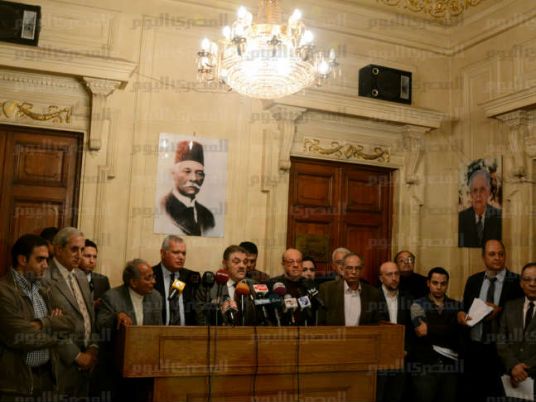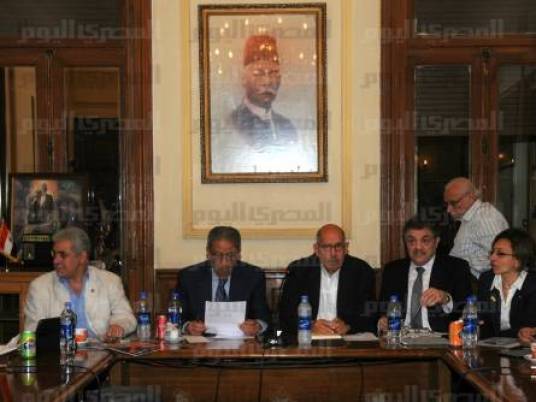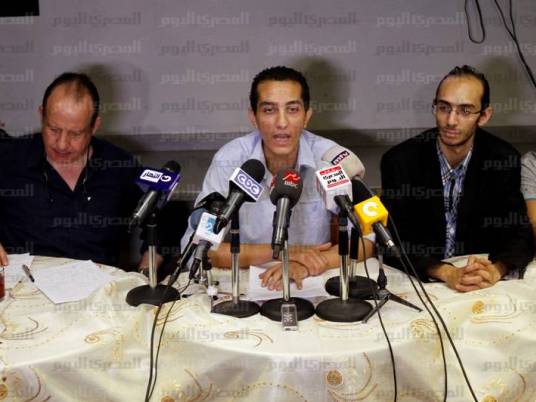As a wave of violence significantly escalated through Egypt’s governorates on Monday, Tuesday’s papers indicate that many Egyptians continue to struggle to make their voices heard after the ouster of former president Mubarak’s 30-year-old regime.
“The people want the downfall of the regime.” This slogan was echoed by thousands of protesters who flooded the streets Monday in a last ditch-effort to end the “Brotherhoodization” of the state, independent daily Al-Watan writes on its front page.
On the second anniversary of Mubarak’s resignation, protesters conveyed a clear message to Mohamed Morsy, the Muslim Brotherhood-affiliated president, that he would face the same fate as his predecessor if popular demands are not heeded, the paper suggests.
Al-Wafd reports that four large marches set off from Al-Fatah and Sayeda Zeinab mosques to join up with other protesters in Tahrir Square, while two other rallies moved to the Ettehadiya Presidential Palace from Raba’a al-Adweya and Al-Nour mosques.
The paper adds that 31 political parties and movements took part in the nationwide protests demanding the ouster of Morsy and dismissal of the Cabinet.
Members of April 6 Youth Movement reportedly staged demonstrations in front of the Supreme Constitutional Court demanding speedier and more efficient trials of those accused of killing the revolution’s martyrs, while the paper reports, the stock exchange building at downtown was the site of a demonstration warning, “retribution or chaos.”
The paper’s coverage of the clashes that went on until evening begins with a bold headline “[civil] Disobedience reaches danger stage.” The articles describe how police sent barrages of tear gas and chased Black Bloc members in the surrounding streets of the Ettehadiya Presidential Palace.
Freedom and Justice, the mouthpiece of the Brotherhood’s political arm, places the responsibility for the current chaotic state the country is undergoing squarely on the shoulders of what it describes as the “counter revolution.”
The paper insists on continuing with its editorial policy, deliberately focusing on the violence, while turning a blind eye to the strong resonance the opposition forces and protesters have in Egyptian society.
Privately-owned paper Al-Tahrir writes that the Brotherhood’s Guidance Bureau points the finger at the opposition coalition the National Salvation Front over causing riots and acts of sabotage of private and public properties under the guise of protecting the revolution.
Flagship state paper Al-Ahram reports that the next round of the national dialogue, scheduled to be held Wednesday, will not impose red lines on the discussion of any crucial issues that need to be addressed in order to defuse the country’s looming crisis.
For its part, the NSF said it would announce its stance today on attending the national dialogue called for by the ultra-conservative Nour Party, independent daily Youm7 reports.
The paper quotes Ashraf Thabet, a senior member of the Nour Party, as saying that it would make all efforts to bring the presidency and opposition powers together to end the political deadlock.
In a two-page spread, Al-Tahrir runs “the secrets behind the assassination conspiracy on the late president Gamal Abdel Nasser by the Brotherhood.”
The first published episode, recounted by the author Mahmoud Salah, portrays the scene of the botched assassination attempt paying much attention to details, capturing the atmosphere and tension of that historical incident.
Salah also writes a short biography of Mahmoud Abdel Latif, a member of the Brotherhood, who carried out the assassination plot and how he was arrested by the army.
On its front page, independent daily Al-Dostour suggests that the Brotherhood is making ongoing attempts to tighten its grip on the political sphere through tactical maneuvers. According to the paper, the group is planning to follow in the footsteps of Iran by overthrowing the Interior Ministry and use its own militias, to take control of the country.
Recently-established newspaper Al-Sabah writes that Shawky Ibrahim is elected to the post of the new Grand Mufti.
Ibrahim, the chairman of the Department of Jurisprudence at the school of Sharia at Al-Azhar University, is the first elected grand mufti, following a history of presidential appointments, before Al-Azhar’s bylaws were amended in the aftermath of the revolution.
Al-Tahrir runs an eye-catching headline on its front-page quoting the newly elected grand mufti saying, “I will announce my political belonging after I am officially appointed.” In his interview with Al-Tahrir, Ibrahim refused to set out his political views, but rather focused on questions of religion.
Egypt’s papers:
Al-Ahram: Daily, state-run, largest distribution in Egypt
Al-Akhbar: Daily, state-run, second to Al-Ahram in institutional size
Al-Gomhurriya: Daily, state-run
Rose al-Youssef: Daily, state-run
Al-Dostour: Daily, privately owned
Al-Shorouk: Daily, privately owned
Al-Watan: Daily, privately owned
Al-Wafd: Daily, published by the liberal Wafd Party
Youm7: Daily, privately owned
Al-Tahrir: Daily, privately owned
Al-Sabah: Daily, privately owned
Freedom and Justice: Daily, published by the Muslim Brotherhood's Freedom and Justice Party
Sawt al-Umma: Weekly, privately owned
Al-Arabi: Weekly, published by the Nasserist Party
Al-Nour: Official paper of the Salafi Nour Party



